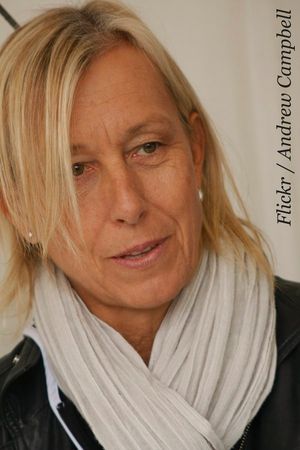Martina Navratilova has come under fire for claiming that it is ‘cheating’ for transgender women to enter female sports tournaments. Though she has now rolled back from the word ‘cheat’, she maintains her arguments bear consideration and should be heard without being vilified as ‘transphobic’.
She first received criticism when she tweeted: ‘You can’t just proclaim yourself a female and be able to compete against women. There must be some standards…’
She went on to write in The Sunday Times: ‘To put the argument at its most basic: a man can decide to be female, take hormones if required by whatever sporting organisation is concerned, win everything in sight and perhaps earn a small fortune, and then reverse his decision and go back to making babies if he so desires.
‘It’s insane and it’s cheating. I am happy to address a transgender woman in whatever form she prefers, but I would not be happy to compete against her. It would not be fair’.
Those comments first led to criticism from LGBT activists. Trans Actual tweeted the following: ‘We’re pretty devastated to discover that Martina Navratilova is transphobic. If trans women had an advantage in sport, why aren’t trans women winning gold medals left, right & centre? Coz trans women don’t have an advantage. Look up the changes that oestrogen makes to the body’.
As a result of all this, Navratilova was criticised and dropped as an ambassador for the LGBT group Athlete Ally. In a statement, the organisation said: ‘Athlete Ally unequivocally stands on the side of trans athletes and their right to access and compete in sport free from discrimination.
‘Martina Navratilova’s recent comments on trans athletes are transphobic, based on a false understanding of science and data, and perpetuate dangerous myths that lead to the ongoing targeting of trans people through discriminatory laws, hateful stereotypes and disproportionate violence.
‘As an organisation dedicated to addressing root causes of homophobia and transphobia in and through sport, we will only affiliate with those committed to the same goal, and not those who further misinformation or discrimination in any way’.
Interestingly, The Guardian reported, ‘Navratilova was criticised by Rachel McKinnon, a Canadian academic and cyclist, who in October became the first transgender woman to win a track world title’ going on to state: ‘The tennis star said she had been “pretty put out” by McKinnon’s accusation that she was transphobic and said she deplored “what seems to be a growing tendency among transgender activists to denounce anyone who argues against them”’.
I can fully understand why a trans activist group would choose to drop her given their very raison d’être is to support and encourage trans athletes. It’s not unreasonable for a charity to drop ambassadors whose views are evidently contrary to their stated aims. And clearly there is something of a storm brewing because she’s taking a lot of heat for her comments in the media.
Ordinarily I’d be quite defensive about somebody being trounced for voicing an opinion, no matter how unfashionable or unsavoury. But I do struggle to have sympathy in this case. Not because I think Navratilova has no right to voice her opinion, I absolutely affirm her right to say what she thinks. But I struggle with the hypocrisy of her comment that transgender activists have a tendency to ‘denounce anyone who argues against them’.
I struggle with that because this is the same Martina Navratilova who wrote an open letter to Margaret Court for voicing her opinion on homosexuality. Was it not Navratilova who ramped up the rhetoric by claiming Court would ‘have blood on her hands’ for her opinions (i.e. her comments will cause people to take their own lives)? Wasn’t this same Navratilova the one who insisted the Margaret Court arena be renamed because of her unfashionable views?
As I commented at the time, I find it troubling that people are so ready to defend the argument, as put by Navratilova, that ‘we celebrate free speech, but that doesn’t mean it is free of consequences — not punishment, but consequences’.
Whilst this may sound sage, it is an affront to free speech as an overt attempt to impede it. What it says is that if you voice views we deem unacceptable, there will be consequences. I can only presume that the distinction between ‘consequences’ and ‘punishment’ refers solely to prison.
Nonetheless, it is clear that views deemed acceptable are considered consequence free. So long as you say the right things, you may say them freely. If you say the wrong things, there will be consequences. We may want to differentiate between punishment and consequences if we like, but both sound extremely sinister.
Even if we buy this line, several questions follow. Who, for example, determines which views are free from ‘consequence’ and which are not? What are the boundaries of acceptable consequences for speech deemed unacceptable? At what point does a ‘consequence’ constitute ‘punishment’?

How, precisely, does the threat of unpleasant consequences (for that is the clear inference) not impede free speech? In what way are we not enforcing certain views, and insisting others are unsayable, by threatening people who dare to voice them?
How ironic then, that Navratilova is now beginning to face the full force of her ‘consequence free’ logic. It seems quite hard for her to maintain that trans activists shouldn’t denounce her for holding the views that she does when she happily insisted that Margaret Court’s name ought to be stripped from the stadium bearing it and that her views should be denounced in the strongest possible terms. If Court has blood on her hands, how can Navratilova escape her own charge?
This, dear reader, is why the prohibitive speech witch-hunt is a game from which we should all quickly take our leave. The only ground on which we can be confident that we have the right to say whatever we think is that we allow others the right to say what they think too.
The new morality insists there are words you cannot say and there is no grace if you utter them. But worse, you may be heralded as a hero for saying and uttering the right views and thoughts one day — berating the right miscreants for their heinous speech crimes — before finding yourself the villain the next day because views you consider entirely moderate have become verboten.
I think we have to resist the push to ban thoughts, views and ideas that we find offensive. We have to resist the push to close down those who would proffer opinions we don’t like. I think Martina Navratilova is entitled to voice her views on trans athletes without fear of reprisal. Unfortunately, she has made her own bed by insisting that those who utter unorthodox views must face ‘consequences’. Apparently, she only intended those ‘consequences’ for those who disagree with her.
Let this moral tale be a lesson to all who would prefer not to be hoist by their own petard. Free speech is important — even for those with whom you deeply disagree and find utterly offensive.
Stephen Kneale is pastor at Oldham Bethel Church in Greater Manchester and blogger at stephenkneale.com
This article was first published on www.stephenkneale.com















